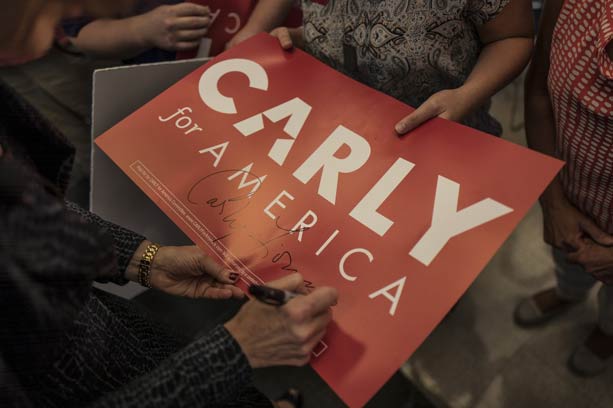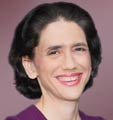
According to a recent Pew poll:
"Today, by more than two-to-one (65 percent to 29 percent), Republican and Republican-leaning registered voters say it is more important that a candidate have new ideas than 'experience and a proven record.' Just five months ago, GOP voters valued experience and a proven record over new ideas, 57 percent to 36 percent."
This sort of data explains why someone with zero experience in elective office (Carly Fiorina) is a plausible nominee and why political lifers like Hillary Clinton and VP Joe Biden are the most likely Democratic nominees. In some sense this is the reverse of 2008 when Democrats swooned over a lightly-credentialed junior senator and Republicans nominated war veteran Sen. John McCain, R-Ariz.
Republicans are not however looking for just any outsider. For one thing, they want a hawk. "Opposition to the Iran nuclear agreement resonates strongly with possible Republican primary voters: 69 percent say they would be more likely to vote for a candidate who wants to end the nuclear agreement, while just 14 percent say they would be less likely to favor such a candidate; 14 percent say this would not be a major factor in their vote. . . . About half (53 percent) say they would be more likely to back a candidate who wants to deploy U.S. ground forces to fight ISIS (22 percent less likely)."
There is more consensus on Planned Parenthood (56 percent "say they would be more likely to support a candidate who wants to end federal funding for Planned Parenthood; just 18 percent would be less likely to support such a candidate") than on immigration. "Opinion among possible GOP primary voters is more divided over a candidate who wants to deport all immigrants who are in the U.S. illegally (43 percent more likely, 29 percent less likely) or wants to compromise with members of the Democratic Party (41 percent more likely, 27 percent less likely)." The zeal for supply side economics also appears to have cooled: "And nearly as many Republican voters say they would be less likely (34 percent) as more likely (31 percent) to support a candidate who wants to raise taxes on wealthy Americans; 34 percent say this would not be a major factor."
This suggests candidates weak or erratic on foreign policy are going to have a tough time. Sen. Rand Paul, R-Ky., may not even make the top tier debate next time. Insofar as Donald Trump seems oblivious to geo-political realities (e.g. cheering for Vladimir Putin in Syria, willing to keep the Iran deal) or Dr. Ben Carson seems like a foreign policy neophyte (e.g. suggesting diplomacy was an option to striking Afghanistan), their opponents will have an opening.
The preference for new ideas over experience explains why, for example, New Jersey Gov. Chris Christie insists he is not running on experience. On ABC's This Week this Sunday he said, "No, I haven't been running on my experience and records. George, in fact, I'm the most detailed person with future plans in this campaign of anyone. . . . . We've given five major policy speeches that laid out specifically what we do, because you know what, the people out there in the audience, they don't care about what I've done. They care about what I'm going to do for them going forward as president of the United States." He insisted, "Campaigns are about tomorrow, not about yesterday. My campaign is about tomorrow and a greater America tomorrow. That's why we've laid out the plans we have."
Taken in totality one can see why the improbable - electing Fiorina -- makes sense in this election cycle. GOP voters don't want a fool or a weakling. But a fierce hawk, determined to innovate and shake up government bureaucracy? No wonder Fiorina is rising rapidly in the polls.
Comment by clicking here.


 Contact The Editor
Contact The Editor
 Articles By This Author
Articles By This Author
